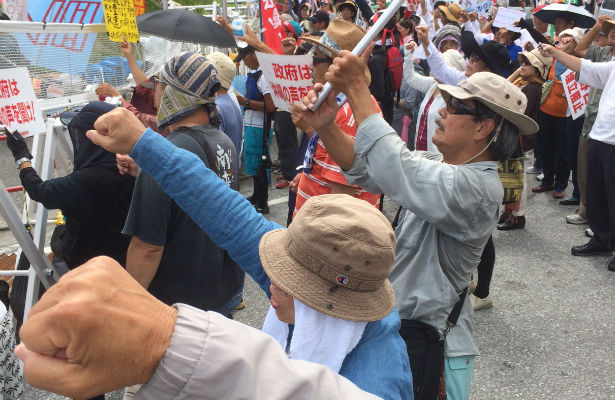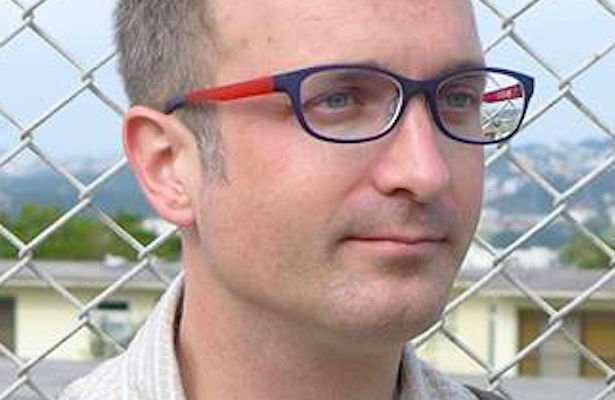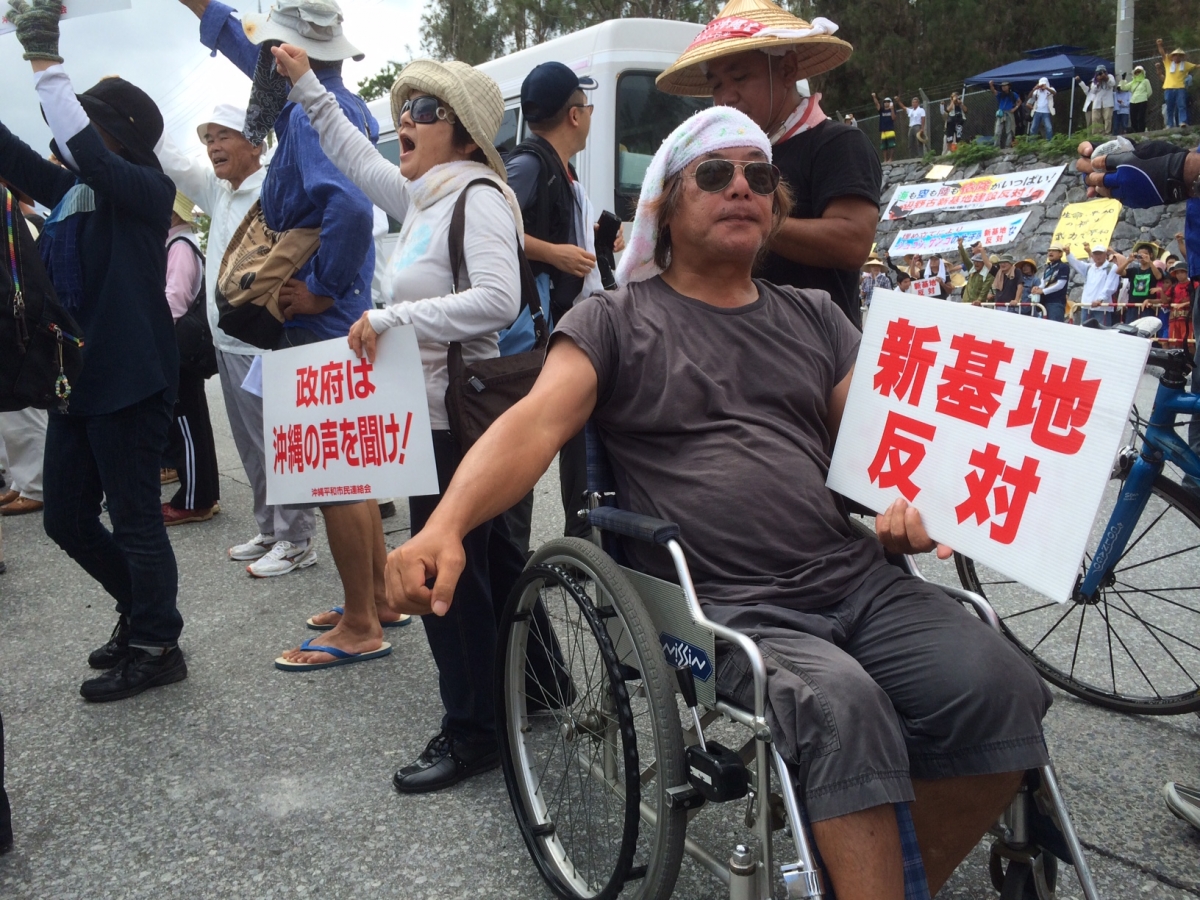A political struggle is unfolding on the Pacific island of Okinawa that is challenging not only President Obama’s bipartisan “Asian Pivot” but the entire battle plan of the US military in Asia.
Unfortunately, you don’t read much about Okinawa in the mainstream media. It’s not even worth a footnote in the China-focused ranks of Washington’s newly muscular national security press or its military think tanks. Except for a few exceptions, not even the left or progressive media have covered it.
Yet the struggles on the island are intensifying every day. Moreover, they’re aimed squarely at one of the keystones of American foreign policy in Asia: a forward US base on the Pacific Rim that’s been used since the Korean War to project American power from Vietnam to the Middle East. Okinawa is home to 19,000 US Marines and dozens of US military installations that include the Marines’ only jungle training center.
The latest shots in the Okinawan standoff were fired in three separate elections that took place last November and December. To the shock of Japan’s ruling Liberal Democratic Party and the Pentagon, anti-base candidates for governor, a key mayoral post, and the island’s entire delegation to Japan’s lower house of parliament (the Diet) swept to power on campaigns calling for the cessation of a new base, which would mean the complete removal of the US Marines from their land.
Much of their ire is aimed at the Marine Corps Air Station at Futenma, a massive air base larger than Central Park that sits smack in the middle of the city of Ginowan. In 1996, after the rape of a Japanese girl by US soldiers sparked fury on the island, the United States and Japan agreed to close Futenma—but then added a provision that the bulk of the Marines would be moved to a replacement base close to Camp Schwab near the northern city of Nago.
Popular
"swipe left below to view more authors"Swipe →

A recent demonstration against the construction of the new base. (Credit: Jon Mitchell)
But Okinawans by a large majority—80 percent in the latest polls—don’t want the Nago base built, in part because it will require the destruction of environmentally sensitive coastal land near the fishing village of Henoko. “I’ve made it my goal not to allow the construction of a new base,” Takeshi Onaga, the new governor, declared after his landslide election.
Abe government trying to squelch the protests
Since then, the right wing, slavishly pro-US government of Shinzo Abe has moved deliberately to lay the foundations of the new airfield by boring into the seabed to prepare for the construction of two runways that would jut into Henoko Bay. Last August, 3,600 people massed in front of Camp Schwab to kick off the recent round of protest. In February, hours before another rally of more than 2,000 people at the base, the US military detained two Japanese citizens (this New York Times article is a good summary, but gets some details wrong). And in recent days, citizens groups have been challenging the ocean drilling actions with a rag-tag navy of kayakers and boaters.
There’s a deep history to the protests. Okinawa is Japan’s southernmost prefecture, and has been effectively occupied by the United States since 1945, when it was the scene of one of the most horrific battles of World War II. During the Vietnam War, Okinawa was the scene of massive protests against the US military, which was using the US Air Force’s Kadena Air Base—known as “the hub of American airpower in the Pacific”—as a platform to firebomb Vietnam.
At one point, the protests turned into insurrection. On December 30, 1970, over 3,000 local residents flooded the streets of Koza City, pulled Americans from their cars and burned their vehicles, then stormed the gates of Kadena and rampaged through the base. According to one report by a US MP on the scene, “by the time the riot petered out 6 hours later, more than 60 Americans lay in hospital and over 80 cars smoldered in Koza’s roads.”
Okinawan workers at the US bases also got deeply involved in the anti-war movement, and launched several strikes against the use of the bases to attack Vietnam. In 2002, I uncovered documents showing how the AFL-CIO, led then by the arch-reactionary George Meany, collaborated with the US Army’s High Commissioner in Okinawa to try to stop a general strike in 1969. As I wrote in The Nation in a story about AFL-CIO foreign policy called “Labor’s Cold War,”
The general strike infuriated Meany and his staff, particularly because it was endorsed by Domei, the conservative Japanese labor federation aligned with the AFL-CIO. In a memo to Meany, his international affairs director, Ernest Lee, warned that the strike was “primarily against the US government authority on the island as well as US foreign policy” and “could affect our Vietnamese effort and support a communist offensive in Vietnam.”
A Welsh reporter in Okinawa
For anyone wanting to know more about Okinawa and its standoff with the United States, the best reporter to follow is Jon Mitchell, a Welsh journalist. Mitchell, who first came to Japan in 1998, has been covering the island for over six years for the Japan Times, a major English-language daily in Tokyo, and other media in Japan and overseas.
I’ve been following Mitchell throughout that time. As someone who came of political age in Japan during the 1960s, participated in antiwar demonstrations in Tokyo, and writes often about East Asia, I highly recommend his work (I discussed my take on the US role in Japan in a recent interview with Consortium News).
One of Mitchell’s most important stories was unearthing the storage, usage and dumping of Agent Orange, the toxic chemical used by the US military in Vietnam, in Okinawa (the discovery of dozens of barrels of the toxin buried by US forces later confirmed his story). Mitchell’s documentary film on Okinawa and Agent Orange won an award for excellence from Japan’s Association of Commercial Broadcasters, a first for a foreign journalist. The Pentagon even launched what Mitchell called a “counter-investigation” into his work.
In another major scoop, Mitchell obtained documents showing that the Pentagon had plans to use Okinawa to attack China with nuclear weapons during the Cuban Missile Crisis. He’s also written extensively on the history of civil disobedience in Okinawa.
Last month, Mitchell revealed that US military officials in Okinawa have forged links with Japanese ultra-nationalists to help them quash the resistance to the base at Henoko. On February 16, he reported in the Japan Times that Robert Eldridge, the Marines’ deputy assistant chief of staff of government and external affairs, appeared on a Japanese rightist TV network and branded the anti-base demonstrations as “hate speech.”
I interviewed Mitchell by e-mail this weekend, just after he returned from another visit to the island. I started by asking about the relationship between Wales and Okinawa.

(Credit: Jon Mitchell)
INTERVIEW with Jon Mitchell
Wales had a long history of resistance to foreign (English) rule and carried out its own struggles to retain its language and sovereignity. How did your Welsh heritage play into your interest in Okinawa?
Wales and Okinawa have so many similarities. We’ve both suffered from oppression at the hands of those in power [England/Japan]. In the past, the English tried to eradicate the Welsh language by forcing schoolchildren who spoke it to wear a punishment plaque. Japan imposed the same system in Okinawa. Today, both Wales and Okinawa are some of the poorest places in their respective countries—but we haven’t lost our pride in our beautiful landscape and history—plus our love of song.
What’s the mix of people leading the protests and the actions in Okinawa? How is the US military responding? What’s the general mood in Okinawa following last November’s elections?
Today, the entire island is aligned against the new base. The governor, the local mayor—and last December all of PM Abe’s Liberal Democratic Party incumbents in Okinawa were defeated by anti-base candidates in Lower House polls. Those demonstrating reflect this popular opposition. This is a civil disobedience movement. It is identical to Gandhi’s and Martin Luther King’s. This is non-violent peaceful protest.
The range of protest is as diverse as those involved. Students hold weekly stew-parties where they cook hot food for the elderly demonstrators—it gets cold in northern Okinawa in winter. Buddhist monks and Christian priests hold prayer meetings. Gospel groups sing “We Shall Overcome.” There are university students, teachers, families, former base workers, international residents, salarymen.
That story you did on the US Marine statement that protesters are guilty of “hate crimes” was astonishing. What are you learning about the US response to the anti-base movement?
Those comments gave us a rare window into the thinking of the US military’s senior officials. Usually they remain tight-lipped, but their accusations of “hate speech,” “funding from the communist party” and “faked injuries” show their disdain for the demonstrators and the people of Okinawa.
The struggle in Okinawa has attracted very little attention from the US media and the national security press corps. There seems to be an assumption here that somehow “we” the USA deserve these forward bases and Okinawans are childlishly complaining about a benevolent force protecting them from the dark side. What is the US media missing on Okinawa? What’s the most important things Americans should know about what’s happening in Okinawa?
In 1969, [former US Ambassador to Japan] Edwin Reischauer called Okinawa “a colony of a million Japanese”—and the US still retains that colonial mindset on Okinawa. Because of World War II, they believe the island is a war trophy. I’ve interviewed many Battle of Okinawa survivors who express their great gratitude to the kindness shown by GI’s following the battle. But today that gratitude has long worn off—six decades of land-theft, crimes and accidents have evaporated that sense of goodwill.
Many Okinawans have an enormous sense of guilt that their island was used in the Vietnam War to kill Southeast Asians. Due to their experiences of the Battle of Okinawa in which almost a third of the civilian population lost their lives, they have an overwhelming sense of “Nuchi du Takara” (Life is precious). But the Pentagon has used their island for a series of failed wars and interventions—Vietnam, Iraq, Afghanistan—and this is why their opposition to the new base is so strong.
Now the US military is working with Channel Sakura, a Japanese TV network that provides a platform for those who glorify Japan’s role in World War II and denies atrocities committed by Japanese troops. One of the USMC’s senior staff has appeared on it twice. AFN Okinawa—the Pentagon radio channel—invited a Channel Sakura host onto a show that was broadcast to US troops. The US military allows Channel Sakura TV crews onto its bases.
This is outrageous. In World War II, 50,000 Americans died or were wounded fighting on Okinawa. They were fighting for freedom and they were fighting against fascism—but now the US military on Okinawa is betraying their memory by working with such groups. If a senior US military official appeared on a neo-Nazi network in Europe, there would be an uproar. But the Pentagon has always felt it could do things on Okinawa which it couldn’t get away with elsewhere.

Okinawans protest at the site of a planned US Marine base in northern Okinawa. The signs read “Japanese government, listen to the voice of Okinawa” and “No new base.” (Credit: Jon Mitchell)
What about the rest of Japan? Is there resistance building to the changes PM Abe is trying to force through on changing Article 9 of the constitution and allowing Japanese troops to be stationed overseas? Particularly among my Baby Boomer generation, there must be millions of people who participated in the anti-war movement in the 1960s.
Okinawa needs to be seen in its historical perspective. Mainland Japan has been discriminating against the island for hundreds of years. In the Meiji era, Tokyo tried to stamp out its culture and its languages. This contempt came to a head in World War II, when the Japanese military sacrificed the island in order to buy time to build up defences for the mainland. Today, Tokyo is ignoring the will of Okinawan people. This is discrimination—pure and simple. And the US is complicit in this. What’s worse is many believe that the brutal tactics being employed on Okinawa are a message for mainlanders preparing to block the restart of nuclear reactors in the aftermath of the Fukushima disaster.
There is a very vocal far right in Japan at the moment—and I’ve had a number of hate mails due to my own journalism. The far right is trying to clamp down on press freedom and the right to peaceful protest. But they are still a minority. The vast majority of mainland Japanese I encounter—students, businesspeople, retirees—want to retain the peace constitution, and they do not want to see Japanese Self-Defense Force members in combat anywhere. There’s still a wonderful love of pacifism in Japan. PM Abe’s support rating appears high—but it is primarily due to two factors: the lack of a coherent opposition and the increasing aggression of the rightwing media.
What can we expect to see in Okinawa this year? And what about the rest of Japan? Does fear of China and/or North Korea trump concerns about the US military buildup in Asia?
Everyone knows about the first battle of Okinawa seventy years ago. But most people outside of Okinawa don’t know about the second battle in 1955 when the US military employed bayonets and bulldozers to force Okinawan farmers off their land to build bases. The memory of both these battles is still strong on Okinawa—and it taught people the truth about militarism. This year, Okinawans will remember both of these anniversaries—and resistance to the new base will remain strong. The Japanese government may start arresting demonstrators, but with opposition so high the jails will be overflowing. There is also a great deal of support for the anti-base movement on the mainland and in Japanese-American communities overseas.
In 2015, both the United States and Japan will continue to play on fears of China in order to justify the ongoing suppression of human rights on Okinawa. But at the same time, both the United States and Japan will continue to enjoy massive trade with China. It is hypocrisy.


